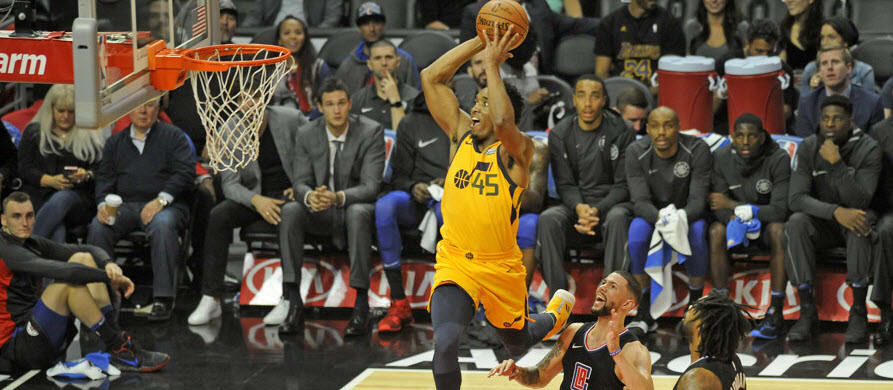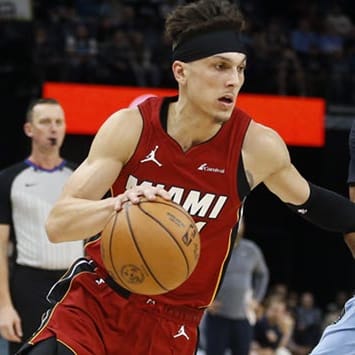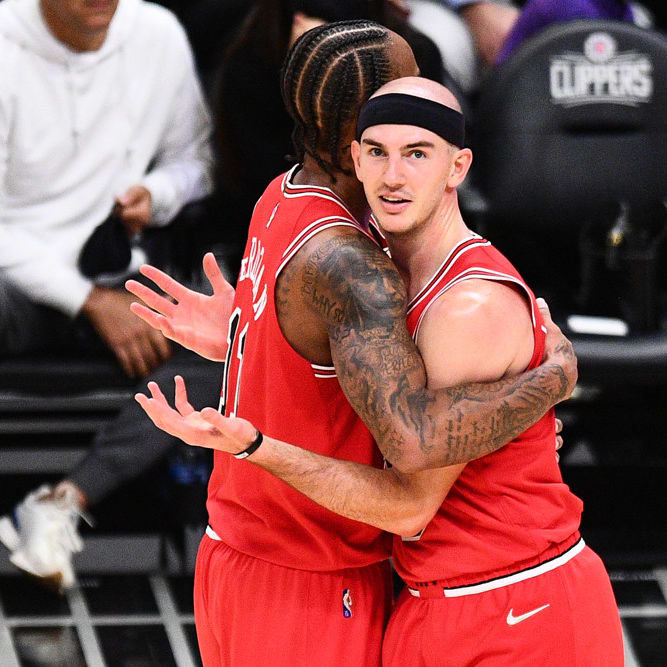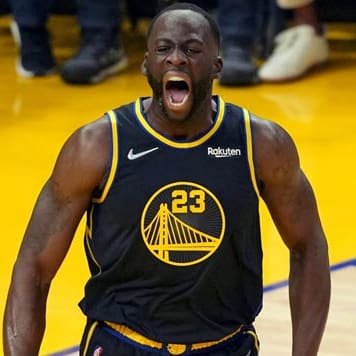This article is part of our Season Review series.
It's never too early to start preparing for next year's fantasy basketball season.
One way we'll help you do that is by reviewing each team, highlighting what went right and what went wrong in 2017-18. We'll also take a look at the current state of the roster to see what moves they could potentially make over the summer, and what impact those could have, from a fantasy perspective.
As we continue to work our way through the reverse order of the regular season standings, it's time to examine the Timberwolves, Jazz and Thunder.
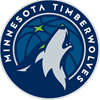 MINNESOTA TIMBERWOLVES
MINNESOTA TIMBERWOLVES
The Good
Head coach and president of basketball operations Tom Thibodeau dove into shaping the Timberwolves in his image this past offseason, adding another pair of his former Bulls charges in Jimmy Butler and Taj Gibson. He also looked to the Midwest to tab a new starting point guard in Jeff Teague, who'd put together a solid 2016-17 campaign in Indiana. Finally, Thibs turned to the ageless Jamal Crawford from the Los Angeles Clippers to serve as a steadying and reliable presence on the second unit.
All four players paid dividends in their first seasons in Minnesota, helping the team reach the postseason for the first time since 2003-04.
Butler overcame a rocky acclimation period to finish the season with averages of 22.2 points (on a career-high 47.4 percent shooting), 5.3 rebounds, 4.9 assists and 2.0 steals. Butler missed a total of 23 games – 18 of them due to a knee injury late in the season -- but he was able to return just before the postseason, though he never quite looked like himself.
Gibson was more of an all-around contributor than in his Chicago days, posting the second-highest scoring average (12.2 PPG) of his career, his best rebounding numbers (7.1 RPG) since his rookie campaign, and 1.2 assists per game. The veteran big man drained his 9.0 shot attempts per game at a career-best 57.7% clip.
Teague played in 70 games overall, finishing with averages of 14.2 points, 7.0 assists, 3.0 rebounds and 1.5 steals across 33.0 minutes per game. For a good chunk of the campaign, the veteran was less involved on the offensive end than usual, which was not necessarily surprising considering the high-powered talent around him. However, Teague's final numbers were on par with his career standards, and his 11.3 shot attempts per game slightly exceeded the 11.0 he put up in his one season with the Pacers.
Crawford shot over 40% for the third straight season, although he saw a drop in minutes to 20.7 per game. The 38-year-old did play in 80 games, usually fulfilling his sixth man role with trademark efficiency, at least by his standards.
Towns saw his scoring average drop, but it had nothing to do with poor performance. Rather, the talented big man unsurprisingly ceded some usage to the talented offseason additions -- Butler and Teague, in particular. However, he still averaged 21.3 points while matching a career high with 12.3 rebounds per contest. What's more, Towns actually posted career-bests in both overall field-goal percentage (54.5%), three-point percentage (42.1%) and free-throw percentage (85.8%).
While there have been rumblings about Towns' dissatisfaction with Wolves' management early this offseason, it's highly unlikely that Minnesota would agree to part with the franchise's most valuable piece since Kevin Garnett. Towns figures to continue his development as one of the most offensively proficient centers in the NBA next season.
The Bad
After raising expectations with a career-best 23.6 points per game in 2016-17, Wiggins experienced a significant downturn this season. His scoring average (17.7 PPG) hit its lowest point since his rookie season, as did his shooting percentage (43.8%). Wiggins also didn't help his cause by draining a career-low 64.3% of his free throws, nearly 12 percentage points worse than his next-lowest figure.
While Wiggins was bound to see somewhat of a downturn in usage with the arrival of Butler, a near-six-point drop in per game scoring was even more severe than most expected. With a season of playing next to his new teammates now under his belt, the hope is that Wiggins bounces back with a resurgent effort in 2018-19, but his name will likely swirl in trade rumors this summer.
Gorgui Dieng proved to be a valuable workhorse over the previous two seasons, playing all 82 games in each while averaging at least 10.0 points, 7.1 rebounds, 1.7 assists, 1.2 blocks and 1.1 steals. However, with the arrival of Gibson, Dieng's minutes experienced a precipitous drop from 32.4 per game in 2016-17 to just 16.9 per game in 2017-18. The reduced playing time predictably led to Dieng's worst numbers since his rookie season, as he averaged a modest 5.9 points and 4.6 rebounds, while also recording less than a block and a steal per game. The big man remains under team control for three more seasons, but Gibson, even as he turns 33 later this month, could once again claim significant minutes at his expense next season.
The State of the Franchise
Despite suffering a disappointing 4-1 series loss to the Rockets in the opening round of the Western Conference playoffs, the Timberwolves appear headed in the right direction after compiling a 47-35 record that was just good enough to sneak into the postseason. The star-laden starting five is projected to return in its entirety, but the second unit needs some reinforcements after Crawford declined his player option and opted for unrestricted free agency. Nemanja Bjelica will also be a restricted free agent, and his departure would further deplete the Wolves' already-very-shallow bench.
Minnesota holds the 20th pick in the first round of the draft, which could yield a viable long-term prospect, albeit one who's unlikely to make much of an impact as a rookie. We'll have to wait and see what the Wolves have in last year's first-rounder, Justin Patton, who spent nearly his entire rookie year -- all but four minutes, to exact -- working back from a broken foot, which he suffered shortly after the 2017 Draft.
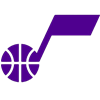 UTAH JAZZ
UTAH JAZZ
The Good
Last offseason, the addition of Ricky Rubio was thought to be a prudent move that would net veteran stability at point guard, as well as a skilled facilitator. However, it also unexpectedly yielded an aggressive scorer with an improved shot who still found a way to provide solid contributions across the rest of the stat sheet. Rubio exceeded his previous scoring high by two points per game, averaging 13.1 points on a career-best 41.8% shooting, including 35.2% from three-point range. The 27-year-old also established a new high-water mark with 10.7 shot attempts per contest, and although his assists naturally took a significant hit with his boost in offensive usage, Rubio still dished out a serviceable 5.3 dimes per contest.
Donovan Mitchell arrived with the 13th overall pick in last year's draft, boasting an all-around skill set that quickly proved more than NBA-ready from the jump. After a brief acclimation period over his first seven games, Mitchell began to hit his stride in November and never really looked back. The Louisville product finished with averages of 20.5 points, 3.7 rebounds, 3.7 assists and 1.5 steals across 33.4 minutes over 79 games, putting up 17.2 shot attempts per contest in the process. Just as encouraging was the fact that he didn't seem the least bit intimidated by postseason pressure, scoring between 22 and 38 points in nine of 11 playoff games, while helping lead the Jazz into the Western Conference Semis.
After three seasons primarily as a reserve, there were some questions about Joe Ingles' ability to handle a starting role heading into the 2017-18 campaign. He addressed those concerns in convincing fashion, finishing the season with solid averages of 11.5 points (on 46.7 percent shooting, including 44.0 percent from three-point range), 4.8 assists, 4.2 rebounds and 1.1 steals in 31.5 minutes per contest. The 30-year-old continued to validate his reputation as a highly durable fantasy asset, as well, playing in all 82 games for the second straight season.
Injuries took their toll on Derrick Favors a season ago, with a left knee bruise robbing him of explosion and stability. That resulted in the Georgia Tech product often looking like a shadow of himself after averaging at least 16.0 points and 8.1 rebounds in each of the previous two seasons. However, blessed with full health coming into the 2017-18 campaign, Favors responded with a resurgent season despite the elevated usage of Rubio and Mitchell, as well as Ingles' emergence. The veteran averaged 12.3 points, 7.2 rebounds, 1.3 assists and 1.1 blocks, posting a career-best 56.3% field goal percentage. The only concern is that Favors now heads into unrestricted free agency, and it remains to be seen if his market value will be one the Jazz are willing and able to meet.
The Bad
Gobert had fantasy owners envisioning an expansive ceiling coming into last season, considering he'd posted career highs in points (14.0), rebounds (12.8) and shooting percentage (66.1) in the 2016-17 campaign. However, a pair of unfortunate knee injuries put a damper on what was otherwise a Defensive Player of the Year-caliber season, leading to drops in each of those categories. The most notable came on the glass, as Gobert averaged just over two fewer rebounds per contest (12.8 to 10.7 RPG), as compared to the prior season. The 26 total games he missed naturally interfered with his rhythm and conditioning, so the hope is a season of full health in 2018-19 would get Gobert's arrow trending back up, especially offensively.
The State of the Franchise
The Jazz look like a squad on the rise following their 48-34 regular-season record and Western Conference Semifinals appearance. Mitchell is a superstar in the making and should only be better with a year of seasoning, while the first unit should be even more efficient as a whole in what will be Rubio's second season running the point. The addition of Jae Crowder at the trade deadline could prove to be especially prudent if Favors departs in free agency, considering Crowder averaged 11.8 points, 3.8 rebounds and 1.5 assists across 27 games after being kicked out of Cleveland.
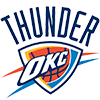 OKLAHOMA CITY THUNDER
OKLAHOMA CITY THUNDER
The Good
The prospect of Paul George and Russell Westbrook elicited mixed reactions initially; while the two stars undoubtedly had the potential to cause plenty of trouble for opposing defenses, there was also a question of how smoothly they'd co-exist once the games began. Ultimately, both players did enjoy successful seasons, even as they overcame some rough patches along the way.
Even with the additions of George and Carmelo Anthony, Westbrook still averaged a robust 21.1 field goal attempts across a career-high 36.4 minutes per contest. He also hit double-digit assists (10.3 APG) and rebounds (10.1 RPG) for the second straight season, while posting the third-best shooting percentage (44.9%) of his career. Westbrook initially took a reduced offensive role as he attempted to incorporate George and Anthony into the offense, but he increasingly took matters into his own hands as the season unfolded. That culminated in a postseason run that came to a fitting end with Westbrook putting up 39 and 43 shot attempts in Games 5 and 6, respectively, against the Jazz.
George's final numbers were also in line with those that he'd made the norm over his last three non-injury-shortened campaigns in Indiana. He averaged 21.9 points, 5.7 rebounds, 3.3 assists and a career-best 2.0 steals across 79 games. George also took a career-high 7.7 three-point attempts per contest while draining them at a 40.1% clip that was the second-best mark of his career. He produced the occasional clunker along the way, but he largely worked well in concert with Westbrook, Anthony and Steven Adams. While his postseason ended on a sour note with a miserable, five-point effort against the Jazz in Game 6 of the Western Conference quarterfinals, George is poised to cash in this offseason if he opts out of the final year of his contract and tests free agency.
Adams demonstrated a degree of offensive improvement two seasons ago, posting 11.3 points on 8.2 shot attempts per contest. He took matters to the next level in 2017-18, averaging career bests in scoring (13.9 PPG), shot attempts (9.4) and shooting percentage (62.9%). Moreover, Adams saw the rest of his game actually thrive – as opposed to suffer – during his breakout, as he also tallied career-high figures in rebounds (9.0 RPG), assists (1.2 APG) and steals (1.2 SPG).
All the more impressive was the fact that Adams accomplished the feat following an offseason where the team added more offensive talent in George and Anthony, in addition to returning the already-prolific Westbrook. Still just 24 years old, the big man should see his fantasy stock bump up significantly heading into next season, as he continues to push further into the top half of centers in the NBA.
The Bad
While his final numbers – 16.2 points, 5.8 rebounds and 1.3 assists per game – look okay on the surface, they belie Anthony's often-disappointing performances. The multi-time All-Star's scoring average was easily the lowest of his career, as were his assists, 40.4 shooting percentage and 15.0 shot attempts per contest. A reduction in usage was both expected and inevitable considering that he shared the floor with Westbrook and George, but Anthony's issues went much deeper. He turned in more single-digit scoring performances than usual and even lost some playing time to Jerami Grant late in the regular season, while also finishing the Thunder's postseason run with a string of wildly disappointing performances.
At 34 years of age, one would expect a further downturn in production next season, although George's potential departure could result in Anthony reclaiming some usage. Like his teammate, Anthony also has a player option this offseason. Should he exercise it, he'll be slated to earn $27.9 million next season, a dollar figure he won't come close to on the open market. There is a scenario in which Anthony opts out and seeks a multi-year deal elsewhere, but his value is at an all-time low heading into the summer, and he'd likely end up sacrificing significant money in the long run.
Arguably the Thunder's best defensive player, Andre Roberson saw his season end in January due to a ruptured left patellar tendon. Despite only serving as a complementary, at best, offensive piece, he was shooting a career-best 53.7% from the field through his first 39 games, while equaling a career best with 1.2 steals per contest. OKC's backcourt defense struggled following Roberson's exit, and the Thunder finished tied with the Hornets for the seventh-highest offensive efficiency rating (21.6) allowed to opposing shooting guards.
It's worth noting that the 26-year-old recently underwent arthroscopic surgery on that same left knee to address some residual swelling. Roberson's status will certainly be something to closely monitor heading into 2018-19, but at this point the hope is that he'll be ready for Game 1 of the regular season.
The State of the Franchise
Despite what on paper would appear to be a successful 48-34 season that ended in a playoff appearance, the reality is the Thunder considerably underachieved. In Year 2 without Kevin Durant, Oklahoma City went all-in on the Westbrook-George-Anthony trio, and the Thunder now risk losing George -- arguably the best long-term asset of the three -- for nothing in free agency.
Regardless of what happens with Anthony, a team built Westbrook will carry plenty of intrigue, but if George skips town and Thunder can't do much to improve on the fringes -- OKC does not hold a first-round pick in the 2018 Draft -- they'll be among the NBA's biggest question marks next season and beyond.

